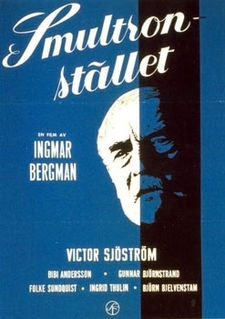
After seeing Bergman’s previous film, The Seventh Seal, I thought his work couldn’t amp up the religious and emotional tones that were established. I was far from right. Wild Strawberries, Ingmar Bergman’s next film after The Seventh Seal, is centered around Swedish professor Isak Borg, as he travels to Lund to receive an honorary degree. It is this chain of events that he is looking forward to that begins his quest inward. The film opens with Borg reminiscing over the course of his life, hinting at an ever present pain. Borg drives to Lund accompanied by his daughter-in-law, Marianne, and traveling group Sara, Viktor, and Anders, the three of whom are going to Italy. As their journey begins, Borg has vivid flashbacks and dreams. The first flashback is him walking down an empty street. His watch has no hands on it, and a horse drawn carriage bearing a casket stumbles down the street. The casket falls to the ground, and breaks, revealing Borg’s own corpse. Borg is haunted by this. Throughout his flashbacks, which include his memories at his parents’ lake house (where the title Wild Strawberries comes from), we learn of the guilt that Borg has carried with him through his entire life. He is guilty for the joyous light energy he never had, for the pain he caused his siblings, friends, and cousins by remaining distant to them. He is looking for an epiphany, but finds only locked doors. The clarification he seeks rather comes during the road trip. As conversations with Marianne and the traveling trio ensue, he comes to terms with himself. The grumpiness of Borg, excellently played by Victor Sjöström, and the tension and nervousness of Marianne, played by Ingrid Thulin, complement each other well. Only through persistence and uncomfortable situations can they come to terms with the divisions Borg has played between them (including his son, and Marianne’s husband, Evald).
With The Seventh Seal, and Wild Strawberries, there has always been something that I have connected to with each of the protagonists. I can feel their pain, indifference to trivial matters, and questions. That may be why I love Bergman’s films so much. That, or hypnotizing direction.
The cinematography shines during the scenes in the strawberry patch, and the classroom in one of the flashbacks, but the rest of the film, visually can be a bit dull at times.
Bergman is at the top of his game with this film, both with directing and writing. The love and tension he can create with such simple scenes is wonderful, while his direction in the flashback and dream sequences is utterly fantastic. Through the simplicity, real life and character development becomes increasingly evident. Bergman knows precisely how to pull in an audience and never let them down. This film, like his other work, is a must see.
4.75/5